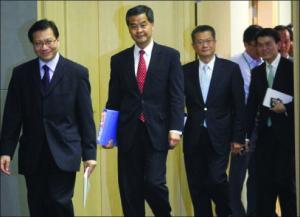HK issues home purchase ban
Updated: 2012-08-31 13:52
By Li Tao (China Daily HK Edition)
|
||||||||
Ten new measures, including one banning out-of-town buyers from buying property in some local housing projects were unveiled by the Hong Kong government on Thursday.
The new policies follow closely the release of a survey showing that over 90 percent of city residents say that home prices have become too high to afford.
The government is setting out plans for a significant increase in housing supply in the city, including the release of enough land to allow for 65,000 new residential units over the next three to four years, Chief Executive Leung Chun-ying said at a briefing on Thursday.
|
 |
|
Chief Executive Leung Chun-ying (2nd left) leaves a press conference after announcing 10 new measures to alleviate the city’s overheated housing problem on Thursday.(Provided to China Daily) |
Units under My Home Purchase Plan (MHPP), which were originally intended solely for rental on a rent-to-purchase plan, will be sold to the public outright, instead, according to the government.
The original rent-to-purchase scheme was set aside, after it became apparent, that the plan, as originally conceived, could not address the imminent supply shortage in the current housing market. Thus, the first phase, of some 1,000 residential units, built in Tsing Yi by the Hong Kong Housing Society will be sold at a discount to eligible applicants whose household income falls below HK$40,000 per month commencing early next year, Leung said during the press conference.
The remaining 4,000 odd units built under the model will also be sold to the public at lower-than-market prices later. The Housing Society is currently studying a longer-term, sustainable scheme to help those earning under HK$40,000 to purchase their own homes in Hong Kong, Leung added.
The "Hong Kong land for Hong Kong people" policy which was articulated in Leung's election manifesto has now entered the legal drafting stage, according to the Chief Executive at his press briefing on Thursday. The government will introduce the policy into terms of property sales in the future when necessary, Leung said. He did not elaborate any specific time frame.
The government has pledged to sell six land banks during the upcoming October to December period, providing enough land to build 1,760 housing units. Together with at least 894 units from West Rail property development projects, the total new home supply, in the next quarter, will reach about 2,650, said the government.
"We may further boost land supply in Hong Kong on market responses," Leung stressed at the media briefing. He added that the government will also speed up the approval of permits for private project sales.
As many as 75,000 new public housing units will also become available in the next few years, according to the government.
Yu Kam-hung, senior managing director, valuation & advisory services, Greater China of CB Richard Ellis, agreed with the government that the solution to inflated property prices in Hong Kong is to maintain a stable land supply to meet the needs of the market at an affordable level.
"No matter what policies the government adopts, as long as residential supplies in the market are not able to meet the real needs, the prices will be unable to turn around," said Yu.
The measures are the toughest since the government increased down-payment requirements for certain home purchases and for non-local buyers in June last year. The city’s property prices have jumped over 85 percent since the beginning of 2009 and have exceeded the previous peak in 1997 by nearly 20 percent, according to the government.
At the same time, local residents avidly contend, the surging prices have become exorbitant and unaffordable. In a survey by the Chinese University of Hong Kong released on Wednesday, more than 90 percent of local residents indicated the city's home prices are already too high to be affordable.
However, a note written by Standard Chartered Bank on Thursday said the latest measures are unlikely to have immediate effect on the city's property prices, given that new homes that are able to be built in the near term remain scarce.
Vincent Cheung, national director of the valuation and advisory service of Cushman & Wakefield, said he is also worried that the expected intensive launch of new properties in 2014 and 2015 will just turn the "hot-spot" market into a cold one.
"The new measures will bring about even more new home supply at that time, which could be too many at once," said Cheung.











